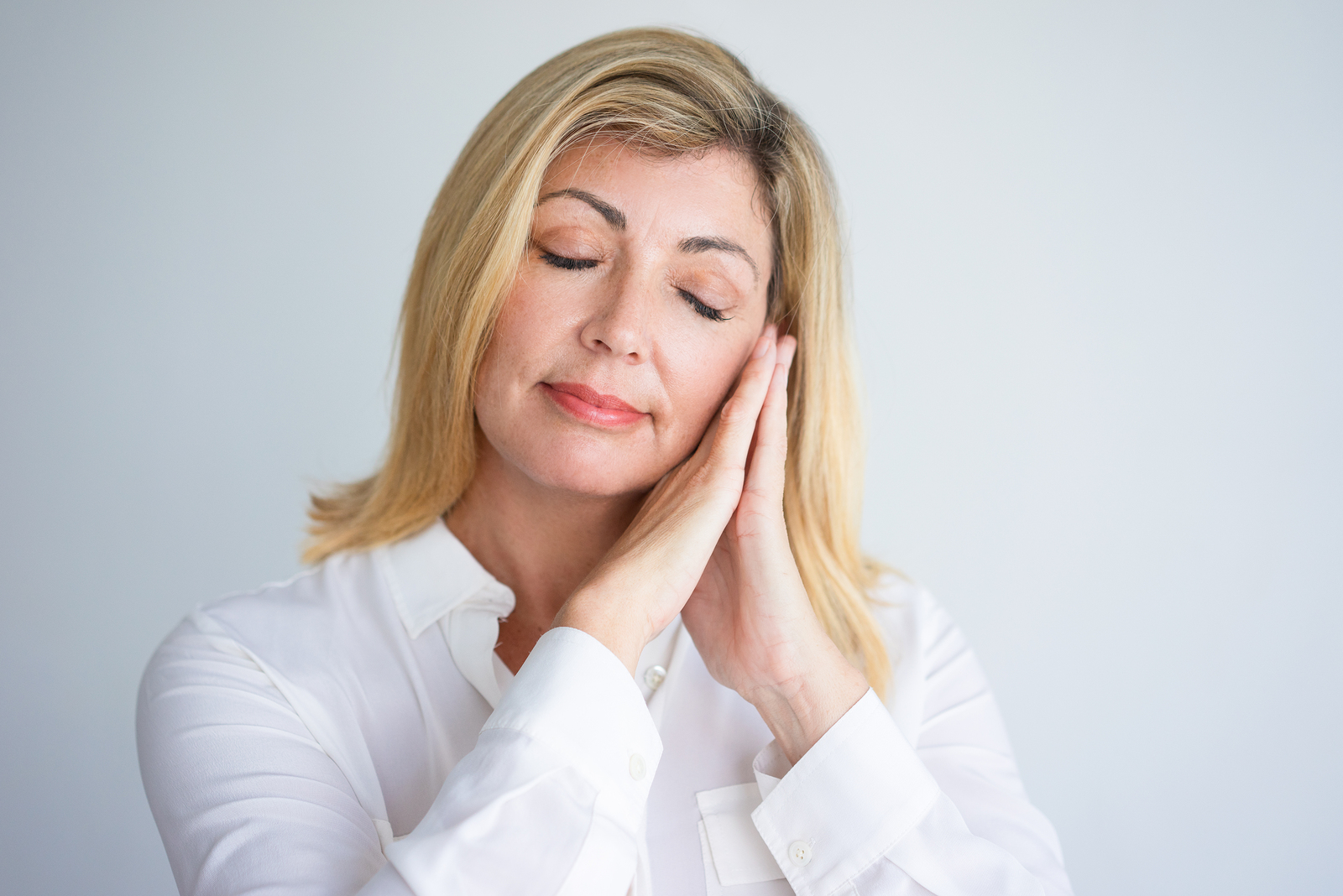Updated 6/28/2020
When I asked Daniela, 33, what her primary reason for coming to see me was, she answered “I’m just so tired all the time. It takes me so long to get out of bed in the morning, and when I do, I feel like I’m just dragging through the day. I used to have so much energy. Now, all I want to do is sleep!”
She’d always managed to keep up with a hectic life, with a job as a full-time office manager, coordinating activities for her two young sons, and even training for a 5K race. Lately, however, she’d had trouble falling asleep at night. She’d wake up to scribble her “to do” lists for the following day, and then have trouble getting back to sleep.
And she wasn’t just physically exhausted; Daniela told me she was having a very hard time focusing on her work and was feeling mentally drained all the time as well.
I wish I could say Daniela’s problem was rare, but I hear this so often from the women I see. Feeling exhausted and worn down is so common, some women think it’s just the way things have to be these days. They’ve talked to their friends, so they know they aren’t alone. And all too many of them just give up and “deal with it.”
That’s a big mistake. The longer this kind of chronic exhaustion is ignored or pushed aside, the bigger the root problem becomes. Eventually, some women find themselves unable to function at all!
This kind of constant fatigue is a sign that something isn’t right in your body’s normal functioning. And it’s something that should be taken seriously! Ignoring fatigue tends to make it snowball, getting gradually worse until you’re like a car stuck on the ice, wheels spinning but going nowhere.
What are common underlying causes of fatigue?
Whenever a woman tells me she’s exhausted, I pay very close attention – even if it’s her only symptom. Fatigue is debilitating and discouraging because it can interfere with every aspect of your life — even the fun things.
For women, fatigue is often related to an underlying issue in the endocrine system. What’s more, one endocrine imbalance may be affected by another — such as over stressed adrenal glands intensifying symptoms of hormonal imbalance.
So many women lead lives full of stress, and this is especially true right now, with concerns around the Pandemic and the civil unrest across the country. Just watching the news can send your stress response through the roof! This constant stress can quickly take a toll on the adrenals, especially on cortisol levels which can either spike or dip too low for too long. Either way, this imbalance in cortisol has an impact on other crucial hormones, such as DHEA and insulin, among others.
High cortisol levels also have a direct impact on your ability to fall asleep, or to stay asleep. Normal cortisol production means that levels are highest in the morning and decline throughout the day. But for many women exhibiting signs of chronic fatigue, the curve is reversed, meaning your circadian rhythm has gone off course. That’s why some women with adrenal dysfunction are exhausted all day long, but get a “second wind” in the evening, and others sleep soundly for several hours, then wake up in the wee hours of the morning with racing thoughts that make it impossible to drift back to sleep.
For more information on adrenal health, read my other articles on the topic, or take my Adrenal Health Quiz to find out where you stand.
Adrenal dysfunction isn’t the only reason you may be feeling fatigued. Other factors include chronic inflammation, food allergies, chemical sensitivities, Lyme disease, and more. We are surrounded by toxins in our environment, both physical and emotional. When these are constantly assaulting your body’s immune system and natural defenses, it’s no wonder it gets worn out!
It’s also important to note that your fatigue could be a combination of several different factors. That’s why it can be so difficult to figure out – and why so many women simply give up. But there’s no need to stay exhausted all the time. I recommend working with a functional medicine practitioner, who will take the time to listen and can offer the right testing options to help you get to the root of your fatigue.
Could it be Chronic Fatigue Syndrome?
Chronic Fatigue Syndrome (CFS) is distinct from the types of fatigue we discuss here. CFS refers to severe, continued tiredness that is not relieved by rest and does not appear to be directly caused by other medical conditions. For more information, read “Beyond Tired: Understanding Chronic Fatigue Syndrome”, “Chronic Fatigue – Get Your Energy Back!” and other articles in my health library on fatigue and insomnia.
The Effects of Constant Fatigue — It’s More Than Being Tired
Unfortunately, women often ignore their increasing fatigue until it leads to other symptoms. By that time, the side effects of fatigue may become nearly constant, including:
- Feeling exhausted (mentally and physically)
- Waking up tired even after a good night’s sleep
- Inability to bounce back from illness
- Headaches
- Joint pain
- Depression
- Poor short-term memory, confusion, irritability
- Food cravings (particularly for sweets/carbs)
- Getting a “second wind” after 6:00 PM that interferes with your ability to sleep later on
And ignoring mild signs of fatigue makes it more likely that you’ll develop more serious conditions, like adrenal fatigue or Chronic Fatigue Syndrome. That’s why it’s so important not to dismiss mild symptoms of fatigue when you first notice them. Slight fatigue is manageable and gives you a perfect opportunity to figure out the cause of your fatigue beforeit becomes debilitating.
At the very least, you should talk to a practitioner about having a blood test to rule out bacterial infection and viruses. Because fatigue can be a common side effect of medications, ask if that could be contributing to your exhaustion. Remember, it’s important to keep taking any medications until you talk to your doctor about stopping.
Why the conventional approach to fatigue misses the mark
So many serious illnesses begin with fatigue, so if you tell your physician that’s becoming a concern for you, it’s very likely they’ll run some tests – particularly if you’re young, like Daniela is. Unfortunately, however, many conventional doctors think that being tired is a natural part of aging, so they’ll dismiss fatigue in older patients.
I strongly disagree and rely on test results to guide my approach to treating fatigue. And unlike many conventional tests that are looking only for disease, I pay attention to the big picture. For instance, if you have test results on the very top or bottom of the “normal” range, I recognize that even though you don’t have a specific disease, you probably aren’t entirely healthy either. I know how quickly those numbers can change, and I also know how important it is to compare results over time…what is YOUR normal, not just the normal.
This is especially true with fatigue. So many women with fatigue have test results considered normal but are quite far away from ideal results.
That’s why I pay such close attention to clients who complain about consistently feeling tired. If fatigue is constant, their bodies clearly need more support, regardless of what the tests say. Living with exhaustion is not an acceptable way to live long term.
What can you do to combat chronic fatigue?
Daniela’s tests showed that her cortisol levels were high, so I gave her the same recommendations I give all my clients who show signs of adrenal dysfunction. And these suggestions can make a difference to your energy and vitality in many circumstances, so I suggest these to anyone dealing with signs of chronic fatigue.
Reduce stress any way you can.
Stress is the number one reason cortisol levels go awry. I know that cutting stress is tricky, especially these days, but it’s non-negotiable if you want to feel your best. Even if you can’t eliminate some sources of stress, you can change your reactions, if you learn the right techniques. Stress isn’t just physical – in fact, emotional stress can take an even greater toll on your health. Try to find ways to discover what stress you’re holding on to (maybe even from childhood) and change your inner dialogue. Reducing stress may take a combination of techniques, but here’s something that is absolutely critical: find joy in something every single day.
Examine what (and how, and when) you are eating.
Good nutrition is the first place to start when addressing constant fatigue. Binge eating carbs or sugar (which often happens when you’re stressed) wreaks havoc on blood sugar levels and hormonal balance. Sure, they may give you an initial surge of energy, but it doesn’t last long, and often makes you feel worse later. And the cycle that can develop creates a downward spiral, leaving your system incapable of getting back on track. Limit simple sugars and carb, and strive for three well balanced meals and two snacks per day that include protein, healthy fats, and plenty of fruits and vegetables.
It’s also important to eat enough – but not too much. Skipping too many meals or eating nothing but vegetables can upset hormonal balance and blood sugar levels, resulting in fatigue. But overeating can also cause fatigue and listlessness, since your body needs a huge amount of energy to digest food.
Exercise wisely.
You may think it’s counterproductive to exercise when you already feel exhausted, but have you ever forced yourself to go for a short walk when you didn’t think you could, and come back feeling energized? Your body does need to rest, but long stretches of inactivity can actually increase fatigue! Consistent exercise (moderate, not vigorous) helps regulate metabolism and get rid of excess cortisol or adrenaline. This allows you to sleep more restfully, another important aspect of fighting fatigue.
Address sleep difficulties.
Hormonal balance depends on good sleep. Most adults need seven to nine hours per night to get the restorative effects of sleep, and that needs to include enough deep (REM) sleep. So many things can disrupt sleep – stress, anxiety, pain, allergies, caffeine, alcohol, hot flashes, illness and so much more. Set a relaxing bedtime routine, and stick to it every night. Make sure your environment is set up for optimal sleep as well; leave electronics outside the bedroom, eliminate ambient light, and be sure the temperature is right for you.
Drink plenty of fluids.
Mild fatigue is often a result of being dehydrated, which happens when your body is eliminating more fluid than you’re taking in. Excess fluid loss can cause short-term memory loss and mental fuzziness, muscle weakness, dizziness, headache, and sleepiness. I encourage clients to get at least eight glasses per day of filtered water, herbal tea, or flavored seltzer. Coffee and soda can make the problem worse, so avoid those whenever possible. Don’t wait until you feel thirsty to hydrate – often that means it’s too late!
Support your body with supplements
Constant stress and exposure to toxins can leave you with a range of nutritional deficiencies due to poor absorption of nutrients. That means that even if you think you’re eating all the right things, you may not be getting the minerals and vitamins your body depends on to function well. Often, when women try my multivitamin formula and really pay attention to their diet, their energy comes back – often quickly and dramatically! If your fatigue has progressed significantly, you may need additional support to feel better quickly. Click here to see what the store at MarcellePick.com has to offer to increase vitality and help you feel great.
Don’t let fatigue stop you in your tracks
Fatigue is your body’s way of calling for support. You have many genuine options to choose from, beginning with the least invasive natural approaches that can effectively resolve your symptoms and rebalance your body.
Daniela followed my advice and was happy to report that after just a few weeks she was sleeping through the night and waking up refreshed. She was back on top of her job, managing her children’s lives (though she did cut down on some of the running around), and her training. In fact, she’d set a personal best in a 5K race!
Daniela’s experience can by yours as well. Fatigue — mild, moderate or severe — can be resolved completely for most women with the right information. Give it a try, and just imagine what you’ll do with all that energy!







